We are Shaping the Future! Showcasing Success Stories as We Innovate for a Sustainable Tomorrow

- Social Innovation through a Collaboration Agreement with Oita Prefecture -
Healthy life expectancy is an important indicator when considering QoL (Quality of Life) in the 100-year life era. This healthy life expectancy is the period of time during which people are able to live independently without being limited in their daily lives by health problems, and many elderly people wish to be able to live their daily lives vigorously and independently without having to rely on long-term hospitalization or continuous long-term care. And, these wishes are supported by care managers (care support specialists) and other care professionals. However, while the number of people who need support is increasing, the training of highly specialized human resources is not keeping pace, resulting in a chronic shortage of workers. In order to solve this social issue, Oita Prefecture, which aiming at "the best healthy life expectancy in Japan", and OMRON are working together to provide Long-term care prevention service utilizing ICT. We will take a look at this project to improve QoL in Japan's super-aged society, its overview and future prospects.
Although Japan has one of the longest life expectancies in the world, the gap between healthy life expectancy and average life expectancy is about 9 to 12 years. In other words, this is the period of time which people are less physically active, have difficulty in living, and are dependent on medical and long-term care services on a daily basis.
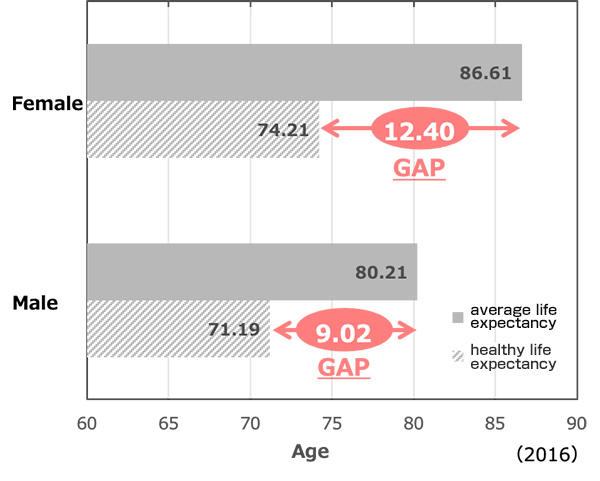
To extend healthy life expectancy and increase the number of independent seniors, it is important to intervene before they need care in order to detect the decline in daily functioning early to prevent its progression. This involves catching the signs of functional decline, identifying the true cause of the decline, taking action to eliminate or reduce it, and restoring daily functioning, as well as regaining confidence and motivation to participate in daily life and society. This entire process is long-term care prevention management that promotes the independence of the elderly.
However, it is estimated that the human resources to support these care services will be in short supply by 550,000 people in 2025, with the supply of 1.9 million care service staff for the demand of 2.45 million people (*1).
In order to fill this shortage, it is important to increase the number of elderly people who are able to live independently, reduce the number of people certified as needing long-term care or support, and at the same time, create an environment in which those working in the long-term care field can work comfortably.
In Oita Prefecture, the site of this project collaboration, has focusing on this field of long-term care prevention, and aiming to realize a system that improves QoL. More specifically, by providing short-term intensive preventive services to the elderly through the intensive involvement of nursing and medical professionals in a short period of time to improve and enhance their motor functions and nutritional status.
Also, in Oita Prefecture, various types of professions have been cooperating with each other to provide the most appropriate services for each elderly person's living conditions through the Community Care Council. Oita Prefecture is providing short-term, intensive care prevention services with programs aiming to improve the daily functions of the elderly and creating a community hub to promote long-term care prevention at the initiative of the residents to extend healthy life expectancy.
In order to accelerate these efforts, it is important to improve the efficiency and environment of long-term care facilities. OMRON's founder Kazuma Tateishi's philosophy was " To the machine, the work of the machine; to man, the thrill of further creation", and OMRON felt that in the long-term care field, this could be accomplished by introducing "automation that energizes people".
Thus, by combining OMRON's technology and know-how with these efforts in Oita Prefecture, we launched a project that aimed to create an efficient and effective system that would promote the independence of the elderly and enable them to live their daily lives with vitality in the community.
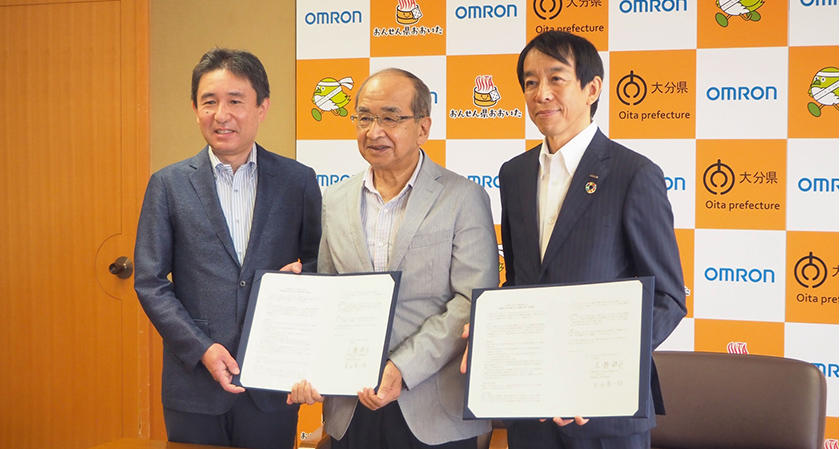
The long-term care prevention service to support the independence of elderly people starts with an assessment of the elderly person's life issues, hopes and possibilities for improvement, which is then analyzed by hearing from the individual and his or her family, followed by goal setting and plan formulation, risk management for operation, and the implementation of actual functional training for daily life.
This is made into a cycle as needed, and the entire process is provided as a short-term, intensive prevention service for three to six months, but the service doesn't end after the person graduates from the program. If we don't ensure their linkage to social participation afterwards, we cannot say that we have truly supported independence.
In order to achieve this, it was essential to ensure that service personnel not only had a high level of expertise, but also that they had sufficient time for communication. Because of the concern about the availability of human resources in the future, we need to relieve the burden on the field in order to spread the long-term care prevention program.
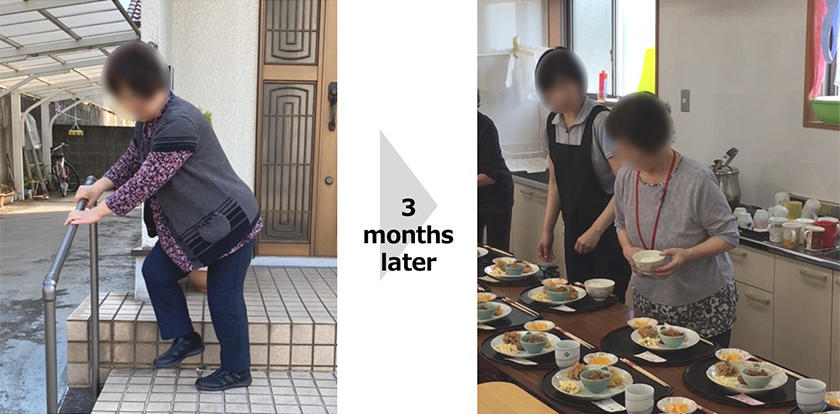
Unstable on-floor movement and gait due to inactivity |
ŃĆĆŃĆĆŃĆĆŃĆĆ |
She became able to participate in volunteer activities |
OMRON takes an approach that fuses the strengths of humans and machines to solve problems, and uses software to support situations that require specialized skills, such as assessment, plan formulation, risk management, and daily living function training. On the other hand, the system uses a hybrid approach that utilizes human abilities for interpersonal skills, such as detecting emotions through communication with the elderly and determining the appropriate frequency and timing for communicating information and instructions, in order to create an environment that allows caregivers to fulfill their true potential while reducing the workload.
The first step in this process is the "Assessment Support" software, which replicates the assessment procedures and thought processes of a caregiver's assessment methods to assist in making decisions. Using a patent-pending algorithm and a proprietary database, it is possible to suggest possible causes of functional decline.
In the demonstration project that will start in September 2020, we will verify the effectiveness of the system while expanding the scope of support provided by the software using tablets in cooperation with Oita Prefecture, municipalities, and regional comprehensive support centers and long-term care offices. We also plan to analyze and validate the effectiveness of the short-term, intensive long-term care prevention service and effective intervention programs by using various data obtained through the system.
Mr. Kato, who is the project leader of the Innovation Exploring Initiative HQ at OMRON, describes the future plans as follows.
"I belong to the Innovation Exploring Initiative HQ (IXI), which is a company-wide platform for innovation and a mechanism that allows aspiring employees to launch new businesses. After studying biomedical engineering at university, I joined OMRON HEALTHCARE with a desire to contribute to the prevention of disease in the field of preventive medicine. When I learned about the activities of Oita Prefecture, I decided to join IXI in order to promote a project to reduce the gap between life expectancy and healthy life expectancy to increase the number of healthy, long-lived seniors."
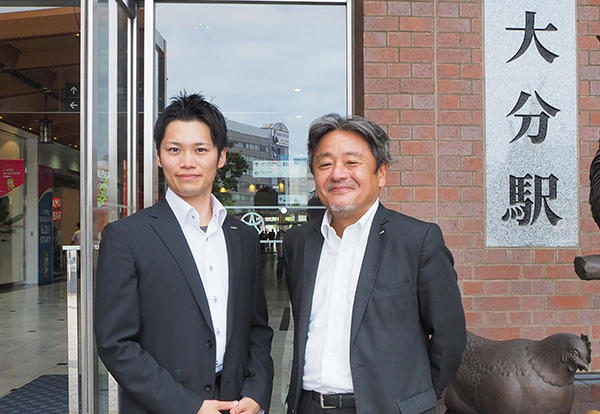 From left to right: Project Leader Kato, Project Manager Kanaoka
From left to right: Project Leader Kato, Project Manager Kanaoka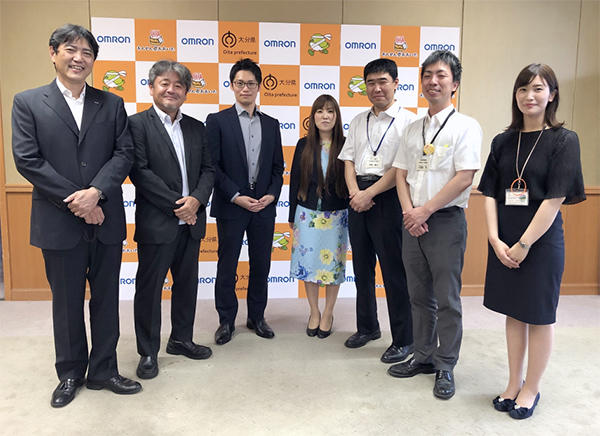
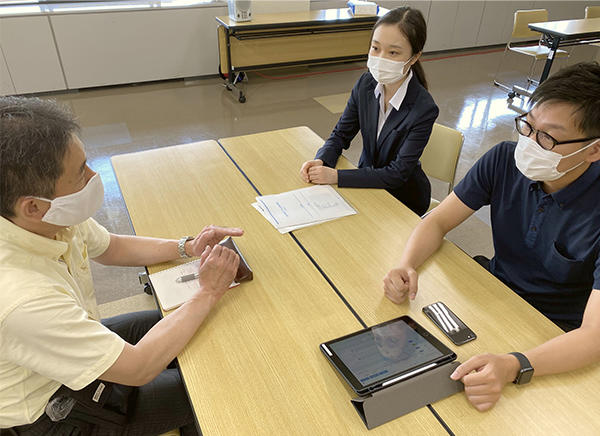
"The first step is to introduce tablets, which will help reduce the workload of busy care managers. However, there are still many issues that need to be addressed, such as a shortage of personnel and differences in the experience and knowledge of each care manager. So, in the next phase, we plan to add a function to support the creation of appropriate care plans by analyzing the information we've accumulated. In this way, we can share the findings of "Master Care Manager" with everyone. The system will draw out the potential of the care managers, and we aim to create a sustainable, self-reliant care management system. We want to make the elderly in Oita Prefecture feel better first. And then we will spread it throughout Japan."
IXI is passionate about creating innovation for these social needs and continues to challenge itself to expand this project to more municipalities.